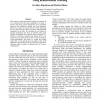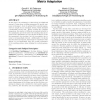152 search results - page 20 / 31 » Time Optimal Control for Quadruped Walking Robots |
121
click to vote
FLAIRS
2004
15 years 1 months ago
2004
Robots that can adapt and perform multiple tasks promise to be a powerful tool with many applications. In order to achieve such robots, control systems have to be constructed that...
125
Voted
GECCO
1999
Springer
15 years 4 months ago
1999
Springer
Genetic programming makes it possible to automatically search the space of possible programs. First we evolved a behavior-based control architecture using computer simulations. Th...
ICRA
2010
IEEE
14 years 10 months ago
2010
IEEE
Robotic manipulators on non-inertial platforms, such as ships, have to endure large inertial forces due to the non-inertial motion of the platform. When the non-inertial platform&#...
107
click to vote
GECCO
2010
Springer
15 years 2 months ago
2010
Springer
In this paper, the advantages of introducing an additional amount of tests when evolving parameters for specific purposes is discussed. A set of optimal PID-controller parameters...
98
Voted
GECCO
2007
Springer
15 years 6 months ago
2007
Springer
Thirteen years have passed since Karl Sims published his work on evolving virtual creatures. Since then, several novel approaches to neural network evolution and genetic algorithm...


